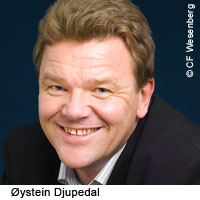Norway: small country, big results
Norway looked ahead to the Seventh Framework Programme (FP7) and took stock of a very successful FP6 when it became one of the first countries to launch FP7 nationally on 13 and 14 November. Norway may not be an EU Member State, but its success rate in FP6 is the envy of many of those that are. One in 10 FP6 projects has involved a Norwegian partner, which is not bad for a country of only 4.6 million people. Proposals involving Norway also have a 28% success rate - significantly higher than the EU average of 18%. These results are no doubt the product of what Norway is doing at home. Norway spends 1.75% of its GDP on research and development (R&D), compared to the EU figure of 1.93% (and 3% is the goal, as in the EU). As highlighted by Robert Jan Smits, Director for 'European Research Area: research programmes and capacity' in the European Commission's Research DG, if Norway were a member of the EU, it would enjoy a high position in the league tables. The country would come in fifth in terms of its number of scientific publications, third for its number of researchers as a percentage of the workforce, and second for its public expenditure on education. As suggested by these figures, Norway takes R&D very seriously. This became all the more evident with the publication of a white paper on research in 2004. In an interview with CORDIS News, Norway's Minister for Education and Research, Øystein Djupedal, described the paper as very important, explaining, 'it's actually the floor of what we are now building'. 'Research has always been an important issue in Norwegian politics, but in this white paper, the aims are very high and ambitious, just like in the Lisbon Strategy - the 3% goal is there, and through cooperation in the [EU] framework programmes we see a lot of the same thematic areas. So we think, from the Norway side, this is one of the most important white papers published,' said Mr Djupedal. In addition to the funding target, the paper highlights internationalisation, basic research and innovation as the priorities for the period 2005 to 2010. The minister said that the paper was very well received by the Norwegian research community. 'Everybody's referring to it all the time,' he said. He also emphasised how the paper had been adopted unanimously by the Norwegian parliament. Norway also has some very successful neighbours as models. 'Of course we look very much to what Sweden and Finland have done. Where they are especially successful and where we are not so successful is with business investment in research,' Mr Djupedal told CORDIS News. Most of Norway's companies would be considered small and medium sized companies (SMEs) in the rest of Europe, with a handful of energy companies the exception. The government is actively investigating what can be done from its side to promote more business investment, the minister explained. The size of its companies is just one of the challenges faced by Norway as a small country. One of the ways in which Norway compensates for its size is cooperating with other countries, particularly through the framework programmes. 'The framework programmes are the most important international cooperation we have. We are a small country, and although we think that we are bright, we have to accept that there are some fairly bright people elsewhere as well! This means that we are very dependent on cooperation.' The approach appears to have been successful, as the minister pointed out: 'Denmark and Sweden and Finland - in the European context we're not big countries, none of us. But our societies are actually quite prosperous.' EU cooperation has also broadened Norway's horizons somewhat, opening doors beyond the Nordic region. 'One of the strange things I just learnt is that although we have historically close contact with, for instance, a country like Denmark, through the Sixth Framework Programme we have even more projects with Poland than we have with Denmark...I was really astonished to learn this, but that's a part of how it should be.' Norway's participation in FP7 is yet to be finalised, but should be a matter of formality as Norway has participated in the framework programmes since the latter part of FP3. Association to FP7 must however be approved by the EU's Council of Ministers and the Norwegian parliament. As the importance of the framework programmes is recognised across the political board, the minister is not expecting any problems. With this enthusiasm for the framework programmes, as well as the attendance of over 1,300 people at Norway's FP7 launch, Norwegian success in FP7 seems fairly certain.
Countries
Norway



